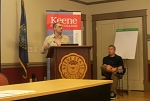

 |
 |
On June 4-8, 2018, the Second Summer Institute "Genocide Studies and Genocide Prevention" took place at Keene State College in New Hampshire, USA. The program was attended by 19 lecturers from African countries, India, various states of the USA, and several European countries. Head of the Department of Genocide Studies at YSU Institute for Armenian Studies, Deputy Director of the Armenian Genocide Museum-Institute, Candidate in History Suren Manukyan participated in this program from Armenia.
The main goal of the Summer Institute was to support the development of genocide studies and genocide prevention in different universities around the world. The lecturers were given the opportunity to discuss, develop, and improve their curricula with different specialists as well as to develop their teaching methodology. "This was a course during which the participants were provided with both teaching experience and assistance in the choice of the topic and compiling the bibliography. Within the framework of the program, we have also received a large quantity of materials, for both theoretical and practical training, which will soon support the application of teaching methods in genocide studies in different educational institutions. During the five-day course, we listened to the leading lecturers in the field, and also acquired a number of skills in practical teaching methodology” — mentioned Manukyan.
Within the framework of the program lectures were delivered by the specialists from different countries such as from the USA, Chile, and Argentina. James Waller, professor at Center for Holocaust and Genocide Studies Keene State College was among them. S. Manukyan noted that Waller is a well-known specialist in genocide studies, a leader in this field who studies social psychological aspects of the genocide and mass participation issues.
Apart from getting acquainted with the teaching methods of different specialists, the participants had an opportunity to present their experiences during the program. “In my turn, I presented the YSU IAS Master's Program ''Genocide Studies'', the courses delivered within the program and I received a number of suggestions. On the last day we also had a general discussion during which each participant presented the work carried out on genocide prevention in their countries. A whole package of materials was provided to organize lectures and to organize interactive discussions in the classroom. For me, the program was very interesting, especially from the point of view of exchanging experience and, certainly, this course was an invaluable experience for every specialist'', — added S. Manukyan.
According to him, it is expected that the genocide prevention course will be introduced at the YSU IAS Master's Program "Genocide Studies". It will be the first experience in the region. ''Indeed, I attach great importance to teaching of this course because, after all, the most important target of genocide studies is the prevention of genocides in the future.''
Back
















